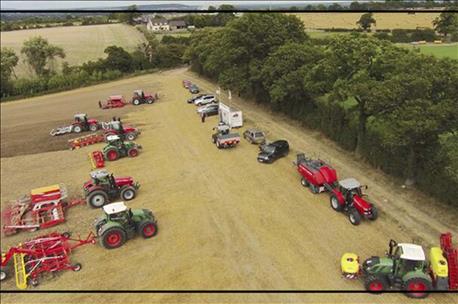
Podcast Link: http://cashcowfarmer.libsyn.com/6-ways-to-show-dad-you-have-what-it-takes-to-farm
The whole story behind Cash Cow Farmer originates with my dad.
He’d been in charge of a farming operation for decades, and I wanted to prove my value to him. Not only that; but to prove it so well that I could completely take the reins from my dad.
When he thought of me running the operation, I wanted him to feel proud, comfortable and excited.
Here I was with this business background, so I built a spreadsheet to show him what every bushel of corn, beans and wheat cost to produce, and then I developed the Cash Cow system as an expanded version of the spreadsheet.

When you’re a farm manager, you have to know everything about your business, including how to run all the equipment.
I knew I wasn’t the only farmer who wanted to prove himself to his father. So this is for all the next generation farmers out there who want to take over their family farming operation.
1) Know how to run every piece of equipment on your farming operation
When you’re a farm manager, you have to know everything about your business.
If you’re running Microsoft or Apple, you don’t need to know all the millions of ins and outs, but on a farm you have to know how every piece of machinery works.
That’s how you become a leader. Nobody’s going to work hard for you if you don’t know what their job entails.
It took me about two years to learn everything myself; by doing everything myself. I bought a combine, and the first time I drove it was on the way home and into the soybean field that I was about to harvest. I just figured it out. Anytime I hit a problem, I’d look through the book or call a friend.
I did the same with every new piece of machinery. Now, when I assign people to work on machinery, I can ask specific questions: What’s your concave at? Are the cobs coming off broken? And so on.
The employees know they can ask me anything, and if I don’t have the answer, I’ll get it fast.
On a farming operation (and for leaders in general), that’s essential.
2) Demonstrate financial discipline
Here’s a simple rule: don't buy unnecessary stuff.
If you build a ‘spender’ reputation, your dad will know that the minute he gives you the keys, you’ll be in debt up to your eyeballs.
Be the cheapest guy out there. Not cheapskate cheap, but conservative. Imagine you’re Warren Buffett.
I didn’t buy anything until I proved to my dad that we were going to make money from it. When I took over, the newest piece of machinery was eight years old, and I’ve slowly bought new machinery. Even if the truck exploded, my dad would just say, “Fix it,” and I would try.
If you demonstrate financial discipline, your dad will say, “This one’s gonna make it.”
Take the example of my 11-year-old son. I asked him what car he would want, and he said a Prius! He said, “Dad, it gets 50 miles to the gallon.” That’s my boy!
Apply that to farming. Give numbers to your father, and blow his mind by mapping out how you’ll save money.
3) Know your inputs and what is a good price for each input every year
Can’t stress this one enough. Know what a good price would be for your inputs: your fertilizers, seeds, fuel, everything.
Cash Cow is one of those great tracking tools where you can see everything you paid last year and bring that to negotiations. You can use it to your advantage.
The dad usually does the negotiating. I established trust with my dad by always knowing where the best deal was: what we paid last year, the difference in what we’re going to pay this year, and why the difference is there.
My dad eventually said to himself, “Why would I waste my time negotiating anymore when Scott has all the answers?”
How did I know where the best prices are? I asked around.
4) Study all the farm programs from the FSA and NRCS
If you’ve read any of my blog posts, you’ve seen me mention this numerous times.
If you know what’s going on with government programs, then you can go in and take care of everything.
No farmer really enjoys going in to the FSA office, so take the burden off your family, know all the deadlines, learn everything you can, and always be looking for new programs you can enroll your farm in to help pay for your investments.
By the way, governments will help cost-share a lot of technology. GPS is an example. You can easily pay for your GPS bill every year with government programs.
5) Understand all the insurance options and how to value them
Insurance is huge.
You’ve got to understand the insurance games, including which level of insurance to buy: trend yield, yield exclusion, etc.
If you don’t understand it, you won’t want to buy it. And if you don’t buy it, you won’t be around for long in business.
How to learn this is obvious: go to your insurance agent and ask them. It’s as simple as that.
If you need help finding the best insurance providers, shoot me an email. I’ll be glad to help.
6) Know exactly what every field brings for profit and loss on your farm
If your dad asks what you guys are making on a rental ground, and you don’t know, guess how much confidence he’ll have in you?
Not much.
So find out. This means you’re using pencil and paper, or spreadsheets, or if you really want to save time, the Cash Cow tool. You’ve got to know what every single field is making on your farm, and if it’s losing money, how to make it profitable.
The discipline of learning and putting good information in your head is essential, especially for future generations who want to make their mark in farming.
The opinions of the author are not necessarily those of Farm Futures or Penton Agriculture.
About the Author(s)
You May Also Like






